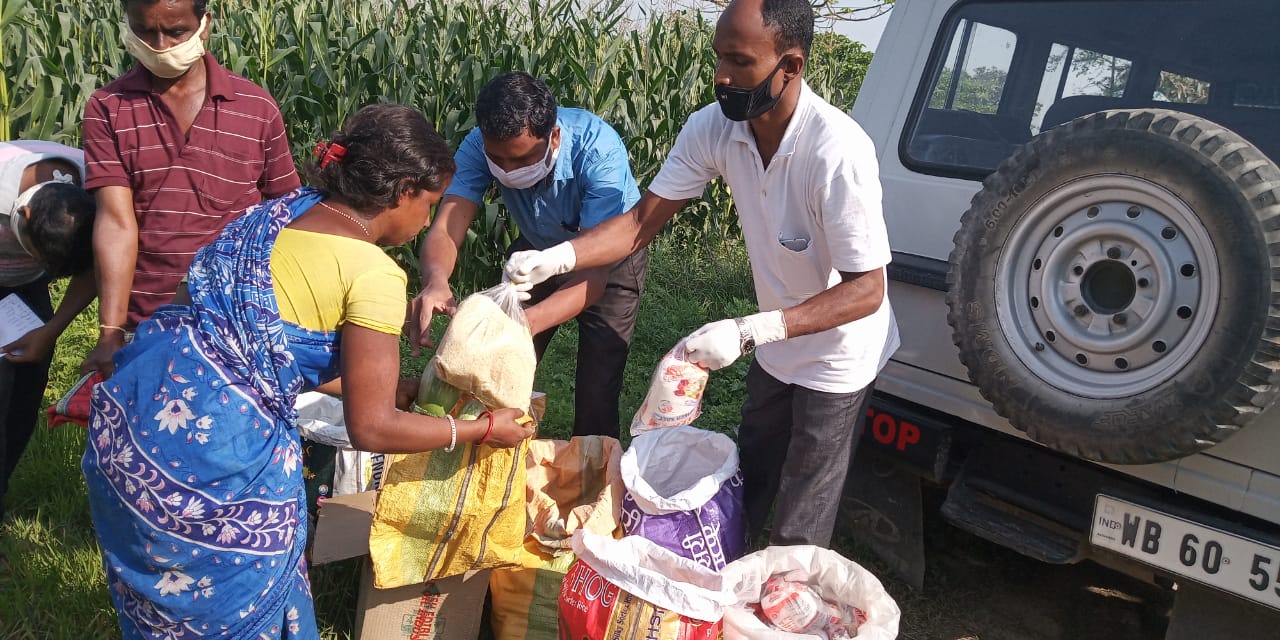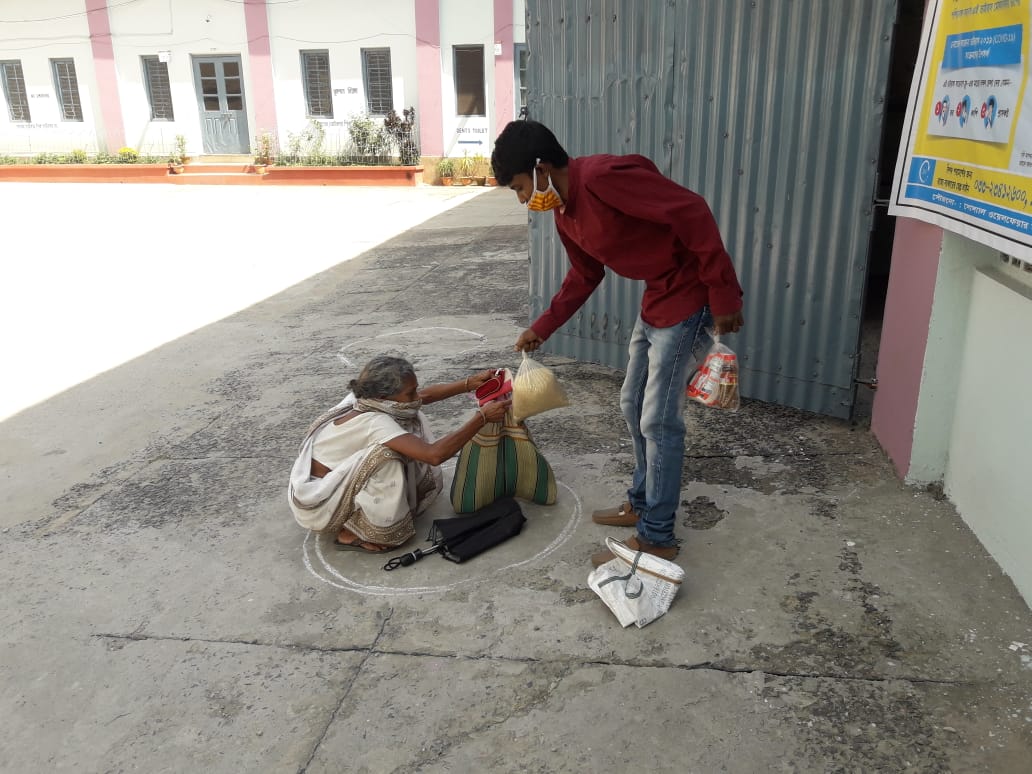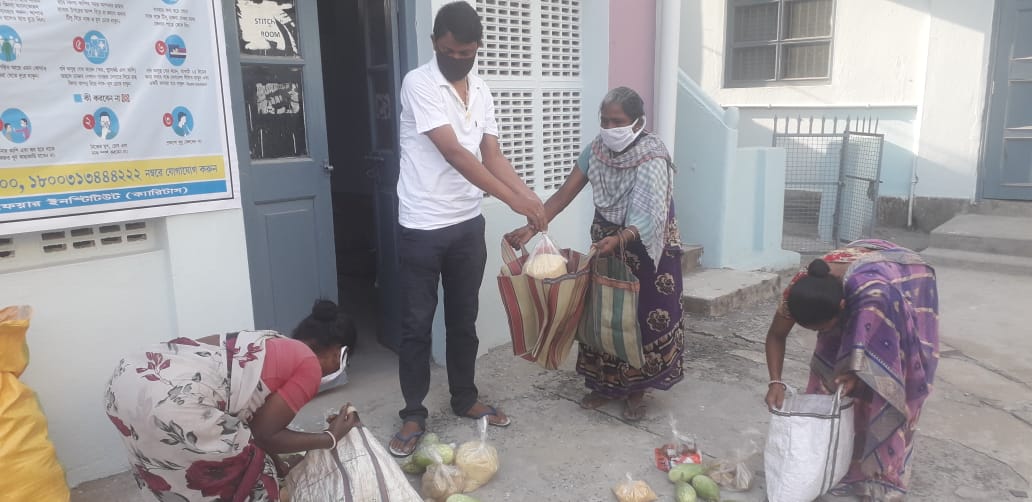A BRIEF REPORT ON
RESPONSE ACTIVITY IN COVID 19
BY –SWI Raiganj / Uttar Dinajpur
THE PREFACE
In order to tackle the crisis, the Indian Government and the all the State Governments have taken serious and drastic steps in an effort to contain the spread of COVID 19. Lockdown has been imposed countrywide. Movement of people has been restricted. Schools, offices, factories, production units, transport system have all been closed, mass gatherings have been banned. Health Institutions, law enforcement agencies and media are exempted from this lockdown.Given the socio economic conditions of the people, lakhs of people migrate around the country in search of work and livelihood. There are the people who are hardest hit by COVID 19 pandemic and the subsequent lockdown. These people live on a daily-earn-to-eat basis. With their daily livelihood severely affected, these people went on a reverse migration to their own villages and towns in order to survive the lockdown. This has not only increased sudden pressure on the local villages and towns but has also increased the possibilities of virus transmission.
I would like to share our status on COVID – 19 here I Uttar Dinajpur Dist., In WB. Being a catholic Civic Society, we have found our roles to be stand in support to the poorest section in the districts in different ways. The problem is yet bigger, and the worst sufferers are the daily wage earners. As we can see that thousands of such people are still trying to return to their houses from different places. Some are even returning by walking with no food, water and enough money during this time. We are happy that both the central and the state Governments have offered us to spread our extended support to them to support the people at large, and announced some schemes for those target population soon to be implemented. We as a civic society felt to perform some part of support from our end to those needy community people according to our feasibility. As per our extended capability and maximum feasibility we were very clear with how we may be incorporated with our extended hands to the Govt. and work as an organization as an individual identity. I hope this report will help you a lot to understand our mode of operation in this matter. We are experts in Disasters management and awareness generation of the society on different social aspects. We have filled up the format in related to that hence.
CIRCUMSTANCE AT INITIAL STAGE
The suddenness of the lockdown and lack of preparedness in form of essential items has hit the poorest sections of the society the hardest. On one hand these people does not have excess money in hand to purchase and stock essential items for long period on the other even if few of them had the money, there was no time given to buy the bare minimum items required to remain at home during the period.Secondly, majority of these people live on daily earnings. With the source of earning now shut down, they are no more earning, yet they have to bear their living expenses. No one is sure how long it would take situation to return to normal. It is true that state governments and government of India has announced economic packages to help the poor and the migrant population, but the specifics of the benefit are still not clear and have not yet reached the poorest sections. The migrant workers who are returning to their rural homes including large sections of people from ST, SC and OBC form the poorest sections of the society. With their workplaces (hotel, restaurants, workshops, factories, construction sites) shut down, layoffs, small businesses closed down, with no money in hand, no provision for food, shelter and treatments in case they are infected by the virus, these people had no other choice but to return home, sometime walking hundreds of kilometers. Even though government has assured the people that essential commodities will be available, yet things are not normal in most areas. Lack of essential items are seen in many placed due to restriction on transport systems, prices of commodities have seen a rise. However, government’s instructions on maintaining social distancing is often seen to be violated in market places as people flock to purchase items. All these have had a severe and acute immediate effect and presumably will have a drastic long-term impact on the lives and future of the poorest sections of the society.
GEOGRAPHYCAL COVERAGE
|
SN |
State |
District |
Block |
Location/ village/ area |
No. of families |
No of individuals |
|
1 |
West Bengal |
Uttar Dinajpur |
Raiganj & Karandighi |
Village:Bhatagram, Khalpara,Ashokpalli,Bhatol , Rangapukur Dhemkir, Gordha, Ambari and Sahapur, |
788 |
12 |
|
1. AWARENESS PROGRAMME |
|||
|
DATE |
NAME OF THE VILLAGE |
BENEFICIRIES COVERED |
REMARKS |
|
18.03.2020 |
Gordha, Ambari & Sitgram |
78 |
|
|
20.03.2020 |
Dhimkir and Rampur |
65 |
|
|
20.03.2020 |
Khempur, Majhok and Bindal |
76 |
|
|
20.03.2020 |
Kochabari and Rashkhawa |
102 |
|
|
21.03.2020 |
Sahapur and Baraghutu |
158 |
|
|
|
|
|
|
|
2. DISTRIBUTION OF MATERIALS |
|||
|
DATE |
NAME OF THE VILLAGE |
BENEFICIARIES COVERED |
REMARKS |
|
22.04.2020 |
Gordha and Ambari |
157 families |
|
|
23.04.2020 |
Sahapur and Baraghutu |
161 families |
|
|
24.04.2020 |
Dhimkir |
120 families |
|
|
25.04.2020 |
Ashok palli |
45 families |
|
|
26.04.2020 |
Bhatagram |
80 families |
|
|
27.04.2020 |
Udaypurkhalpara |
58 families |
|
|
28.04.2020 |
Chotparua |
89 families |
|
|
30.04.2020 |
Rangapukur |
38 families |
|
|
30.04.2020 |
Bhatol |
45 families |
|
|
8.4.2020 – 30.04.2020 |
|
40 families |
|
PROJECTED BUDGET
|
SWI,Raiganj Budget Estimate for COVID 19 Response in Uttar Dinajpur |
||||||||
|
Relief Items |
Description |
Number of Units |
Unit Cost (Rs) |
Cost per Family |
Total Number of Families |
Total Amount |
||
|
A |
Items per family |
|||||||
|
|
|
Rice (kgs) |
5 |
26.00 |
130.00 |
800 |
104000.00 |
|
|
|
|
Pulses (kgs) |
0.5 |
80.00 |
40.00 |
800 |
32000.00 |
|
|
|
|
Mask |
4 |
40.00 |
160.00 |
800 |
128000.00 |
|
|
|
|
Bathing Soap (pcs) |
1 |
15.00 |
15.00 |
800 |
1200.00 |
|
|
|
Transportation cost |
Purchase and transportation of food, nonfood items |
|
|
|
3,400.00 |
||
|
|
|
TOTAL |
|
|
345.00 |
800 |
276000.00 |
|
|
|
|
GRAND TOTAL |
|
|
|
|
279400.00 |
|
A total budget of Rs. 100000. From our donor agencies have projected and utilized to cover up almost 500 total beneficiaries of our project from the same area with mentioned items using the same budget amount. Local transportation cost and some food cost of this activity has however, spent from our own pocket. The entire activity has been performed with the leadership of the Director of the organization with a close coordination with local administration, and the project field staffs successfully. We really are thankful to our Donors that we have received many supports from them according to their capability as we are always having this pleasure in any critical situation and circumstances.
MAJOR ACTIVITIES
1. AWARENESS GENERATION
We as a community-based organization and a collaborating partner of different national and international donor agency has been put a step ahead in this critical moment of COVID-19 outbreak through awaking people with most important and major Dos and Don’ts for the village and community people using local staffs in the operational zone, sometimes through micking and sometime at an individual level. We have already been familiar with the farmers, the people and villagers of these blocks for the last 25 years as beneficiaries of our projects being implemented to different areas of this block and the other adjoined areas. These people are directly involved with these projects and a better witnessed of many ups and down with SWI activities. In this tough time so we thought to aware these people about the effect of this deadly endemic named Novel Corona Virus. This also shows that SWI has not just implemented their projects in these areas but also involved emotionally with their lives directly or indirectly so. The area like the extreme part of this district where there is no lights, electricity and or better internet facilities the field staffs have worked day and night for awakening people about this pandemic at a glance door to door and para wise at the same time. However, SWI plays a major role to restrict people within their home with their awareness campaigns such a way. The entire project team of ours has lead this operation for the last one week AROUND each corner of their project operation area in this district dedicatedly with support from OUR DISTINGUISHED DONORS. Blocks like Raiganj and Korondighi and the adjacent area has been covered during these days for the people of these villages.
2. DISTRIBUTION OF RELIEF ITEMS
|
SN |
Kit |
Description (types of items with quantity, types of services) |
Quantity enough/ meal served for how many days |
No. of families |
No. of individuals |
|
1 |
Dry ration/ food kit (for a family of #, for # days) |
Rice- 5kg, Dal-500gm, Salt -1kg |
|
218 |
12 |
|
2 |
Hygiene kit |
Soaps-2 (400gm) |
|
218 |
12 |
|
3 |
Community kitchen established |
|
Number of days it was run |
NA |
NA |
|
4 |
Cooked meal served (# breakfast, # lunch, # dinner) |
|
|
NA |
|
|
4a |
Breakfast |
|
|
NA |
No. of meals served |
|
4b |
Lunch |
|
|
NA |
No. of meals served |
|
4c |
Dinner |
|
|
NA |
No. of meals served |
|
5 |
Counselling/ Psychosocial support |
|
Hours of service provided |
NA |
|
|
6 |
Face mask |
mask |
|
908 |
12 |
|
7 |
Sanitizer |
2 lifboy soap (400gm) |
|
218 |
12 |
|
8 |
Hygiene promotion |
Briefly describe the content and medium used |
How many days it was done? |
|
|
|
9 |
Others (pls add rows and define others) |
|
|
|
|
3. RESOURCE MOBILIZATION
|
SN |
Resources |
Type of service provided (contribution) |
Reach (I-Individual, HH-Households) |
Quantify in INR |
|
1 |
Volunteers |
9 – volunteers 8 hours of service |
12 |
– |
|
2 |
Amount mobilized from other sources |
NA |
|
|
|
2a |
CSR support |
NA |
|
|
|
2b |
Community contribution |
NA |
|
|
|
2c |
Institutional contribution |
Purchase and transportation of food, nonfood items |
|
|
|
3 |
Psychosocial support/ counselling |
# hrs of counselling to # individuals |
|
– |
|
4 |
CBOs involved |
NA |
|
|
|
|
Others (pls add rows and define others) |
NA |
|
|
MAJOR STRATEGY
While each of us certainly hopes that corona virus won’t become a major health event in their part of the world, the reality is that businesses are already considering every contingency plan with a close eye towards avoiding serious disruption of their operations. The response strategy is based on several planning assumptions. Owing to the considerable uncertainty surrounding the extent of the outbreak within the area, the transmissibility of the virus, and the clinical spectrum of the disease, it will be necessary to regularly update these assumptions as gaps in our knowledge of the disease are filled. The current response plan assumes that human-to-human transmission takes place, and that it may be amplified in specific settings, including healthcare facilities. We also assume that human-to-human transmission is widespread within our operational area that we tried to be restricted through awareness. While the response emphasis will be to rapidly identify and isolate imported cases, there is a risk of clusters of cases caused by localized community transmission. In some cases, we may require operational assistance to strengthen their capacity to detect and respond to these imported cases. However, there remain significant uncertainties around the potential for more widespread transmission outside our operational area, and it will therefore be necessary to have contingency plans in place to mitigate the challenges this would present.
v Limit human-to-human transmission, including reducing secondary infections among close contacts and healthcare workers, preventing transmission amplification events.
v Better awareness generation through announcement and door-to-door information generation
v Identify and reduce transmission from the animal source.
v Address crucial unknowns regarding clinical severity, extent of transmission and infection, treatment options, and inform medical dept. about any suspicious case.
v Minimize social and economic impact through multispectral partnerships with donors, local clubs etc.
MAJOR LEARNINGS
v The pandemic is bringing with it a major economic and financial crisis. Facing the economic consequences of coronavirus is a major challenge for national governments, European institutions and the international system. There is an urgent need to understand the extent of the crisis and the nature of the health, social and economic problems we face as well as to update the policies that have led to this crisis.
v The economic consequences of the coronavirus pandemic are wide-ranging, affecting the way the world economy works. A number of lessons can be learned, starting with our views on health and the public good, on the possible changes in the relationships between health, economics and politics.
v The coronavirus pandemic is rapidly changing health conditions, daily life, social relationships and economic prospects around the world. It is important to learn the key lessons of its economic consequences and open up a debate on the possible actions that can set our societies on a more stable, healthy, egalitarian and sustainable trajectory of development.
v Another most important point is how to work in such lockdown situation. We are quire experienced in handling natural disasters and lots of rehabilitation work but not such before. We always tried to keep our staffs safe all around the time and deliver the work to the neediest of our operational area.
MAJOR CHALLENGES
v This is however the first time that we have faced such kind of situation and handled by us with care. The foremost learning for us is how to work in a pandemic situation as we have no trainings, no prior experience and above all this is very new to the world.
CONCLUSION
This is a highly tough time and SN is fully engaged with awareness generation process in their operational area with close coordination to local administration so far. After these days it was been expected that to some extent of villagers will remain stay at home and helps in making successful this locked down situation and above all helps I breaking the chain of this deadly virus called Novel Corona. Currently like every Indians, we are just praying to the god, the almighty for a relief very soon. However, currently our major moto is to provide at least the healthcare item to the needy farm families so that they can also protect themselves from this highly infectious pandemic. This report will help them to understand how we have projected their support and in which way we have utilized and for whom. I am happy and felt obliged as a director to have these agencies and their guidance with support as one of our esteemed donor.



